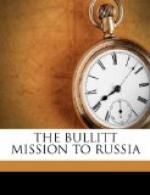Senator KNOX. Was there any formal meeting of the peace conference, or of representatives of the great powers, to act upon this suggestion and upon your report?
Mr. BULLITT. It was acted upon in a very lengthy, long-drawn-out manner.
Immediately on my return I was first asked to appear before the American Commission. First, the night I got back I had a couple of hours with Col. House, in which I went over the whole matter. Col. House was entirely and quite decidedly in favor of making peace, if possible, on the basis of this proposal.
The next morning I was called before the other Commissioners, and I talked with Mr. Lansing, Gen. Bliss, and Mr. Henry White all the morning and most of the afternoon. We had a long discussion, at the end of which it was the sense of the commissioners’ meeting that it was highly desirable to attempt to bring about peace on that basis.
BREAKFAST WITH LLOYD GEORGE
The next morning I had breakfast with Mr. Lloyd George at his apartment. Gen. Smuts and Sir Maurice Hankey and Mr. Philip Kerr were also present, and we discussed the matter at considerable length, I brought Mr. Lloyd George the official text of the proposal, the same official one, in that same envelop, which I have just shown to you. He had previously read it, it having been telegraphed from Helsingfors. As he had previously read it, he merely glanced over it and said, “That is the same one I have already read,” and he handed it to Gen. Smuts, who was across the table, and said, “General, this is of the utmost importance and interest, and you ought to read it right away.” Gen. Smuts read it immediately, and said he thought it should not be allowed to lapse; that it was of the utmost importance. Mr. Lloyd George, however, said that he did not know what he could do with British public opinion. He had a copy of the Daily Mail in his hand, and he said, “As long as the British press is doing this kind of thing how can you expect me to be sensible about Russia?” The Daily Mail was roaring and screaming about the whole Russian situation. Then Mr. Lloyd George said, “Of course all the reports we get from people we send in there are in this same general direction, but we have got to send in somebody who is known to the whole world as a complete conservative, in order to have the whole world believe that the report he brings out is not simply the utterance of a radical.” He then said, “I wonder if we could get Lansdowne to go?” Then he immediately corrected himself and said, “No; it would probably kill him.” Then he said, “I wish I could send Bob Cecil, but we have got to keep him for the league of nations.” And he said to Smuts, “It would be splendid if you could go, but, of course, you have got the other job,” which was going down to Hungary. Afterwards he said he thought the most desirable man to send was the Marquis of Salisbury, Lord Robert Cecil’s brother; that he would be respectable enough and well known enough so that when he came back and made the same report it would go down with British public opinion. Mr. Lloyd George then urged me to make public my report. He said it was absolutely necessary to have publicity given to the actual conditions in Russia, which he recognized were as presented.




